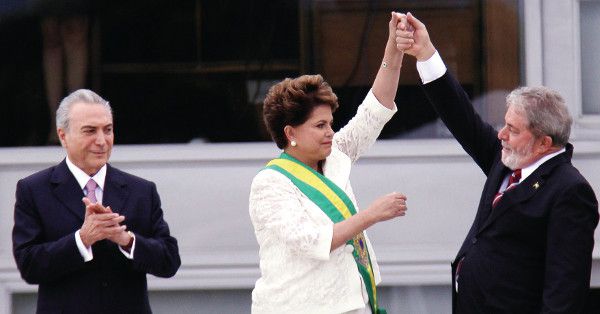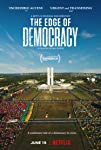Eye For Film >> Movies >> The Edge Of Democracy (2019) Film Review
The Edge Of Democracy
Reviewed by: Amber Wilkinson

Petra Costa considers the state - and history - of her Brazilian homeland in this absorbing hybrid of essay film, political and personal documentary, which is short-listed for the 2020 Oscars.
The film - which is available on Netflix with narration from Costa in either Portuguese or English - considers the nascent and fragile state of the democracy in Brazil, setting it in historical context. It is also an examination of the re-emergence of the extreme right heralded by the election of current president Jair Bolsonaro, in which many people living in countries, including the US and UK, may find echoes of their current political landscape. The film is tied to Costa's own life in two ways - firstly, she is almost the same age as the post-dictatorship world she is outlining and secondly, her family has ties both to the affluent establishment through her grandparents' construction company and to the revolutionaries through her activist parents. This 'skin in the game' element adds both to the melancholic nature of Costa's consideration of where the country is now and leads to some interesting interrogation of her ideas, with her admitting her own limitations - a rare thing in a documentary.

Aside from the film's personal edge, this is mostly a potted - and melancholic - guide to the world of Brazilian politics since the mid-Eighties, although it begins towards with the end, with former president Lula (Luiz Inácio Lula da Silva) being carted off to jail. Costa then spends much of the rest of the film charting how this came to pass, outlining Lula and the Workers' Party's rise to power before covering the leadership and slide into controversy of his successor Dilma Roussef and the resurgence of the far-right.
There's a lot of ground to cover, but Costa keeps a strong grip on the material, showing Brazilian protests of various sorts as we see the country's populace choose their 'team' - left or right - right down to the colours and examining the way that Lula reached an 'accommodation' with business before he rose to power. This accommodation will come to seem more thorny as the film progresses, as Costa constantly probes at the idea of elites running the system to their advantage. The Roussef material, though featuring strong interviews with the woman herself, is perhaps the hardest to follow as Costa races through how she lost favour with the populace. She is back on firmer ground, however, as she covers the Car Wash scandal that would come to dog the left, letting it play out in thriller terms as she delves into the murky areas where big business and cash rub shoulders with political decision making. The judiciary, in particular, comes in for heavy scrutiny - something else that might spark shared experience elsewhere in the world.
Throughout it all, Costa mixes the cut and thrust of political life with calmer camerawork - in particular, some sedate drifting through the empty presidential palace - that helps to add visual interest, while the scoring has just the right edge of dissonant horror about it. Costa notes a Greek adage that "democracy is only working when the rich feel threatened" - something we might all want to try to remember as populism rises and money whispers sweetly to our elites.
Reviewed on: 09 Feb 2020
















